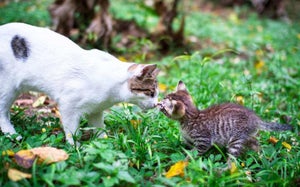
We’ve probably all done it; when your dog sits and watches you eat with their large, loving eyes, begging for a bite of your meal and you give them a piece of food. Don’t give in. Firstly, this isn’t doing them any favours behaviourally – if you give in once, your dog will learn that they will get food if they do this, and more likely than not will pester you every time you eat something. You are also providing additional calories which your dog may not need. More importantly, by giving your dog extra treats from your table you could be inadvertently feeding them something toxic. Here we’ve outlined some of the main foods that you should avoid feeding to your dog.
Chocolate
As much as we love chocolate as a tasty treat, it is a very dangerous snack to feed your dog. We’ve gone into more detail about why dogs shouldn’t eat chocolate here, but if your dog eats chocolate they could suffer from theobromine poisoning and show signs of vomiting, diarrhoea, seizures and even internal bleeding.
Onions (or any of the Allium family)
Humans love the onion family (including garlic, spring onions, leeks and chives), and we put these ingredients in a lot of foods; however, these bulbs can be highly toxic to our pets. They contain a substance which dogs and cats don’t have the enzymes to break down. These toxins can cause haemolytic anaemia which is where the red blood cells in the body burst. Allium ingestion will more commonly cause breathlessness, fatigue, vomiting and diarrhoea but can prove fatal. You need to be very careful about what you feed your dog as these foods can be toxic, cooked or raw, and are put into a variety of foods in powdered form.
Grapes (and their dried form raisins, sultanas and currants)
The exact substance in grapes and its dried form which is toxic to dogs has not yet been identified, however it is known to cause a variety of health problems, with kidney failure and even fatality reported in dogs. Similarly to chocolate, the degree to which these food items affect health varies depending on the individual, but it is always best to avoid feeding them, just to be safe.
Xylitol
Xylitol is an artificial sweetener which can be found in foods such as some peanut butter, sweets, chewing gum, conserves and baking mixes. This sweetener causes insulin release in most animals, except for humans. Insulin release results in a drop in blood sugar level level (hypoglycaemia) which can cause lethargy, vomiting, seizures, liver failure and even death. It is often suggested, as a treat, that your dog can be given peanut butter in a puzzle feeder to keep them occupied for longer periods of time. If you’re going to do this, make sure that you check that it contains dog-friendly ingredients. Peanut butter is high in sugar and fat for your pets, so instead we would recommend portioning off some of your pooch’s daily kibble ration, soaking it in warm water and packing that into a puzzle feeder. To make it even harder, or a nice refreshing treat in summer, you can also freeze it!
Macadamia nuts
Unlike the other substances in this article, macadamia nuts have never reportedly been fatal to a dog, nevertheless, they do cause toxicity which can lead to vomiting, fever and ataxia (loss of control of bodily movements). There are quite a lot of other nuts that can be harmful to dogs if ingested, so it is best to avoid them all.
Dairy
As much as dogs seem to love cheese as a treat, and cats salivate over a little saucer of milk, we shouldn’t indulge in this. Similarly to some humans, many dogs and cats cannot fully digest dairy products. This is because our adult pets don’t have sufficient quantities of the enzyme required to break down lactose, the sugar that is found in milk. Intolerance to dairy can cause upset stomachs in our pets, including nausea, bloating, tender abdominal area and diarrhoea. Again, lactose affects each animal differently, but as dairy products are also high in fat it is best to avoid giving them any. It is worthwhile to remember, James Wellbeloved diets are nutritionally complete, which means they have all the nutrients your pet requires in the correct amounts to keep them living a happy and healthy life!
Need more advice? Speak to our pet nutritionist, Alice!

Related Articles








